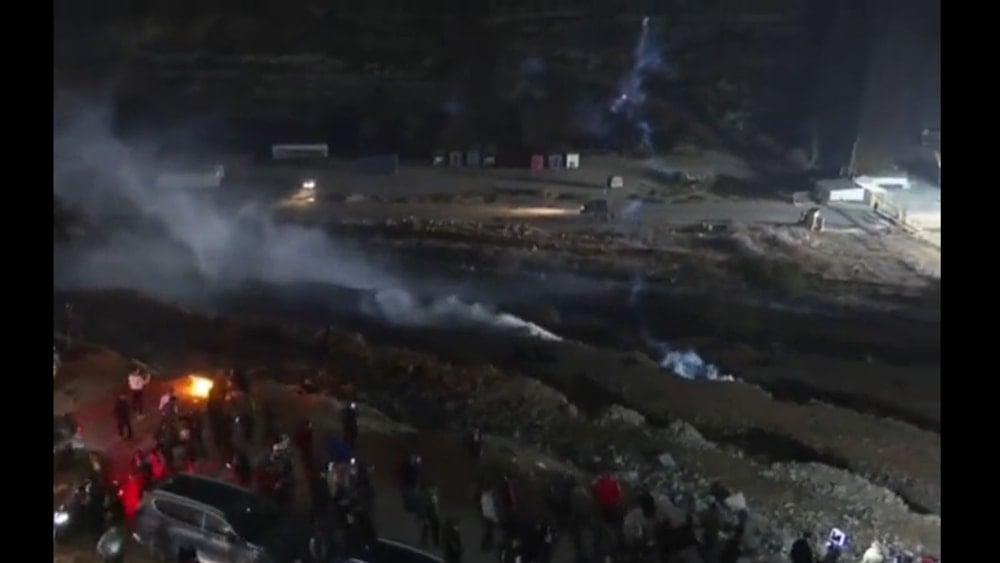Israeli forces suppress prisoners' families awaiting their release
The Israeli occupation forces are mobilized in the parameter of "Ofer" prison to prevent the families of liberated prisoners from receiving their loved ones who have spent years behind bars.
-

A screen grab from a video depicting the Israeli forces firing tear gas at a gathering of Palestinians that were celebrating the release of women and children from Israeli prisons, "Ofer" military prison area, occupied West Bank, Palestine, November 24, 2023 (Social Media)
The occupation forces were mobilized in the parameter of "Ofer" prison, preventing the families gathered in its vicinity from receiving the liberated female and child prisoners who attained their freedom due to a deal imposed by the Palestinian Resistance on the Israeli occupation.
The Israeli occupation forces opened fire and used tear gas grenades against hundreds of Palestinians gathered in front of the Israeli prison. Two Palestinians were shot at and sustained injuries near "Ofer".
Simultaneously, the Israeli occupation forces raided the homes of Palestinian female prisoners just before their release.
قوات الاحتلال تطلق قنابل الغاز بشكل كثيف تجاه الأهالي، تزامناً مع الإفراج عن الأسرى قرب سجن "عوفر" غرب رام الله#الكيان_الغاصب pic.twitter.com/V76VG8Yo5a
— NA BI LA FDL 🇱🇧 (@NanoNan33446258) November 24, 2023
The Palestinian female prisoners, who will be released as part of the deal between the Israeli occupation and "Hamas," left Damon prison in Carmel under strict supervision, heading towards Ofer prison.
Meanwhile, the Israeli occupation's government imposed conditions on the male and female prisoners to be released, telling them they were prohibited from speaking to the press and issuing any press statements, be it by themselves or any of their relatives.
The Israeli occupation forces also prohibited any gatherings at the homes of the prisoners or any form of celebration of their release, the Palestinian Prisoners Club said.
The Israeli occupation forced the prisoners to sign a written commitment, with a fine of 70,000 shekels in case any of the conditions were violated.
Read next: Israeli authorities take brutal measures against Palestinian prisoners
A four-day humanitarian pause went into effect in Gaza at 7 am (GMT+2) Friday after a deal was reached between the Israeli occupation and Hamas on the matter.
The truce will last for four days subject to potential extension. The truce entails the liberation of a number of imprisoned Palestinian women and minors (under the age of 19) from Israeli occupation jails and the admission of relief aid and fuel in the besieged Gaza Strip.
During the 47 days leading up to the ceasefire, 7,000 civilians were recorded to be missing, including more than 4,700 children and women.
Read more: Gaza ceasefire deal does not include Lebanon: Israeli media
The agreement reached through Qatari and Egyptian mediation efforts was scheduled to go into effect on Thursday. However, Israeli media outlets reported on Wednesday evening that the deal was not finalized and is likely to start on Friday instead.
The limited truce remains under heavy criticism by international organizations, human rights activists, and several countries and officials calling for an immediate ceasefire rather than an insufficient truce.
These calls have been rejected by both the United States and the Israeli occupation entity, stressing that the aggression must continue until all "Tel Aviv's" objectives are fulfilled, something which military experts and diplomats expressed extreme doubts.
The terms include a halt to all hostilities and the release of 50 Israeli captives in exchange for the freedom of 150 Palestinian prisoners.
Read more: US fears journalists enter Gaza during truce, expose Israeli crimes

 3 Min Read
3 Min Read










